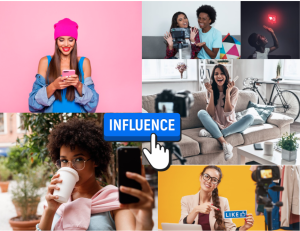
Introduction
The film industry, traditionally dominated by Hollywood studios, renowned directors, and star-studded casts, is undergoing a transformative shift. This shift is driven by the rise of digital influencers who are increasingly becoming pivotal players in the entertainment landscape. These influencers, who initially gained fame on social media platforms like Instagram, YouTube, and TikTok, are now making significant inroads into the film industry. This article delves into the growth of digital influencers in the film industry, exploring their impact, the opportunities they bring, and the challenges they face.
The Rise of Digital Influencers

-
What Are Digital Influencers?
Digital influencers are individuals who have garnered a substantial following on social media platforms. They create content that resonates with their audience, ranging from lifestyle and beauty tips to gaming and comedy. The authenticity and relatability of these influencers have made them immensely popular, particularly among younger demographics.
-
The Evolution of Digital Influence
The concept of influence is not new. Celebrities have long influenced public opinion and consumer behavior. However, the digital age has democratized influence, allowing ordinary individuals to amass large followings and wield significant power. This shift has been facilitated by the accessibility of social media platforms and the rise of user-generated content.
Digital Influencers Enter the Film Industry

-
Collaborations and Cameos
One of the initial forays of digital influencers into the film industry was through collaborations and cameos. Filmmakers recognized the potential of influencers to attract their massive online followings to the box office. Influencers like Liza Koshy and King Bach made appearances in films, bringing their unique style and humor to the big screen.
-
Leading Roles and Production
As influencers proved their mettle, their roles in films expanded. Some influencers transitioned from cameos to leading roles, while others took on production responsibilities. For instance, YouTube star Lilly Singh, known for her comedy sketches, ventured into late-night television and film production, showcasing her versatility.
-
Influencer-Driven Films
The film industry also witnessed the emergence of influencer-driven films. These are movies where digital influencers play central roles, and their social media presence is integral to the film’s marketing strategy. Films like “The Thinning” and “Smosh: The Movie” leveraged the popularity of influencers to reach a wider audience.
The Impact of Digital Influencers on the Film Industry

-
Marketing and Promotion
Digital influencers have revolutionized film marketing and promotion. Their vast online followings provide a ready-made audience for film promotions. Influencers can generate buzz through trailers, behind-the-scenes content, and interactive sessions with fans. This direct engagement with audiences creates a sense of anticipation and excitement that traditional marketing methods often struggle to achieve.
-
Audience Engagement
One of the key strengths of digital influencers is their ability to engage with their audience on a personal level. This engagement translates to the film industry, where influencers can foster a sense of community around a film. By sharing their experiences and insights, influencers make audiences feel more connected to the film and its characters.
-
Diversification of Content
The inclusion of digital influencers in the film industry has led to a diversification of content. Influencers bring fresh perspectives and unique storytelling styles, catering to niche audiences that were previously underserved. This diversification has enriched the film industry, making it more inclusive and representative of different voices.
Opportunities for Digital Influencers in the Film Industry

-
Expanding Creative Horizons
For digital influencers, venturing into the film industry offers an opportunity to expand their creative horizons. It allows them to explore new genres, experiment with different storytelling techniques, and collaborate with established filmmakers. This creative growth benefits both the influencers and the film industry.
-
Monetization and Brand Partnerships
The film industry provides digital influencers with lucrative monetization opportunities. Influencers can secure brand partnerships, sponsorships, and endorsement deals related to their film projects. This additional revenue stream enhances their financial stability and incentivizes them to continue creating high-quality content.
-
Building a Diverse Portfolio
By participating in film projects, digital influencers can build a diverse portfolio that showcases their versatility. This portfolio can open doors to new opportunities in acting, directing, and producing. It also enhances their credibility and reputation within the entertainment industry.
Challenges Faced by Digital Influencers in the Film Industry

-
Stereotyping and Typecasting
One of the challenges digital influencers face is stereotyping and typecasting. Given their online personas, influencers are often pigeonholed into specific roles that align with their social media content. Breaking free from these stereotypes requires effort and perseverance.
-
Balancing Online and Offline Presence
Maintaining a balance between their online and offline presence is another challenge for digital influencers. The demands of the film industry can be time-consuming, leaving influencers with limited time to engage with their online audience. Striking a balance is crucial to sustaining their influence and relevance.
-
Navigating Industry Dynamics
The film industry operates differently from the digital world. Influencers must navigate the complexities of film production, distribution, and marketing. Understanding industry dynamics and building relationships with key stakeholders is essential for their success.
Conclusion
The growth of digital influencers in the film industry is a testament to the evolving nature of entertainment. These influencers bring a fresh perspective, innovative marketing strategies, and a dedicated audience to the table. While they face challenges, the opportunities for creative expansion and monetization are immense. As the film industry continues to embrace digital influencers, we can expect a more diverse and dynamic entertainment landscape.
In conclusion, the symbiotic relationship between digital influencers and the film industry is poised to reshape the future of cinema. By leveraging the strengths of both worlds, filmmakers and influencers can create compelling content that resonates with audiences worldwide.










